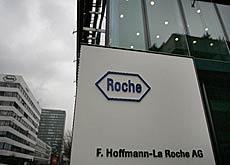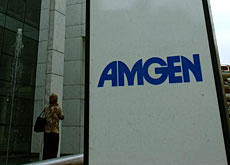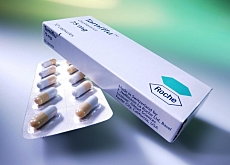Roche faces new hurdle in getting drug to US market

Swiss pharmaceutical firm Roche faces a potential legal battle to sell a new anaemia drug in the United States, following claims it infringes a rival's patent rights.
Amgen, the world’s largest biotech company, has asked the US authorities to block imports of the “potential blockbuster” drug Cera, claiming Roche copied its processing methods.
“Roche remains confident that Cera does not infringe on any patent. The fact that Cera was granted a patent in the US in 2003 shows that it is a useful and novel product,” Roche spokeswoman Martina Rupp told swissinfo.
Amgen’s move is seen by Swiss analysts as a blocking manoeuvre, aimed at protecting its hold on a highly lucrative market.
Amgen’s complaint hinges on the way Roche developed the key protein of Erythropoietin (EPO) during the laboratory production of Cera. The drug, which is still being developed, has the potential to treat people on kidney dialysis and cancer patients undergoing chemotherapy.
The US International Trade Commission will decide within 30 days whether to launch an investigation that could last several months.
California-based Amgen has already filed a patent infringement lawsuit in the courts against Roche last November in an attempt to prevent the manufacture or sale of the drug.
The move follows Roche’s announcement that it intended to file the drug for approval in the US in the first half of this year.
Patents
But Hernani De Faria of the Zurich Cantonal Bank does not think Amgen will win the argument. “Patents do not apply to molecules or natural proteins, but to the process by which they are turned into drugs,” he told swissinfo.
“I do not believe Roche would copy Amgen’s process and give their competition something easy to defend in the courts.
“Rival companies are free to develop improved products, but they have to be manufactured in different ways. That is the only limitation to competition.”
The US is the world’s largest pharmaceutical market and Amgen has two anaemia drugs which brought in combined sales of $6 billion (SFr7.8 billion) last year.
Roche current anaemia drug NeoRecormon chalked up sales of SFr2.2 billion in 2005.
De Faria believes Cera could make an initial SFr800 million to SFr1.2 billion in sales in the first two years on the market with the potential to do even better if it also proves successful as a cancer treatment.
No hurry
However, De Faria believes Roche is in no hurry to bring Cera on to the market. “Cera has the potential to be a blockbuster, but Roche is concentrating its efforts on the key areas of oncology and virology at this moment,” he told swissinfo.
“Roche still has several big selling oncology drugs and it does not make sense to rush Cera on to the market at this time. They will wait a couple of years until oncology drug sales start to fall.”
Roche shares dipped more than one per cent on the news of the attempted block of Cera, further depressed by disappointing sales growth of lymphoma drug Rituxan produced by daughter company Genentech.
swissinfo, Matthew Allen
Roche, which was founded in 1896 in Basel, has core businesses in pharmaceuticals and diagnostics.
The group is the number one in the global diagnostics markets and is a leading supplier of medicines for cancer and transplantation.
The Basel-based company, which reported a net profit of SFr6.7 billion in 2005, employs around 68,000 people and is active in 150 countries.
Amgen is the world’s largest independent biotechnology company. Founded in 1980, the firm posted revenues of $10.5 billion in 2004 and currently employs over 14,000 staff.
The California-based company earlier this year decided against building a new production plant in Switzerland, preferring Ireland instead.

In compliance with the JTI standards
More: SWI swissinfo.ch certified by the Journalism Trust Initiative












You can find an overview of ongoing debates with our journalists here . Please join us!
If you want to start a conversation about a topic raised in this article or want to report factual errors, email us at english@swissinfo.ch.